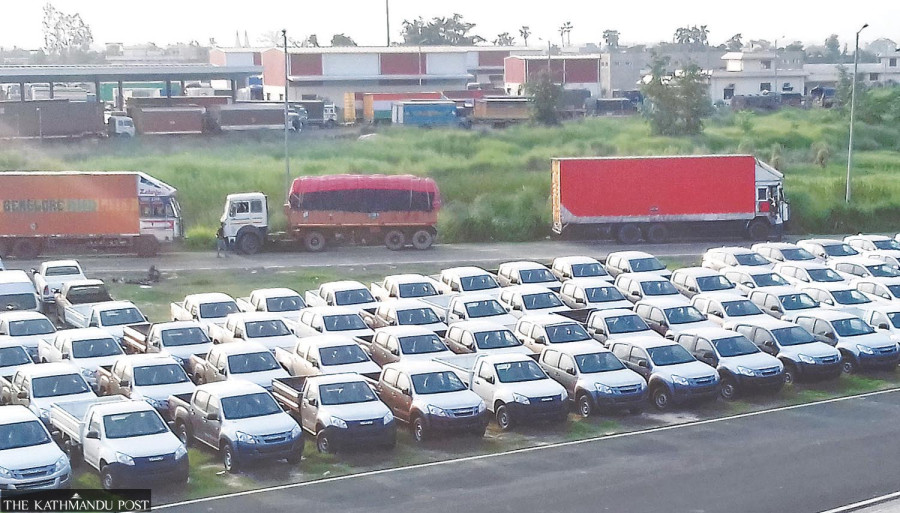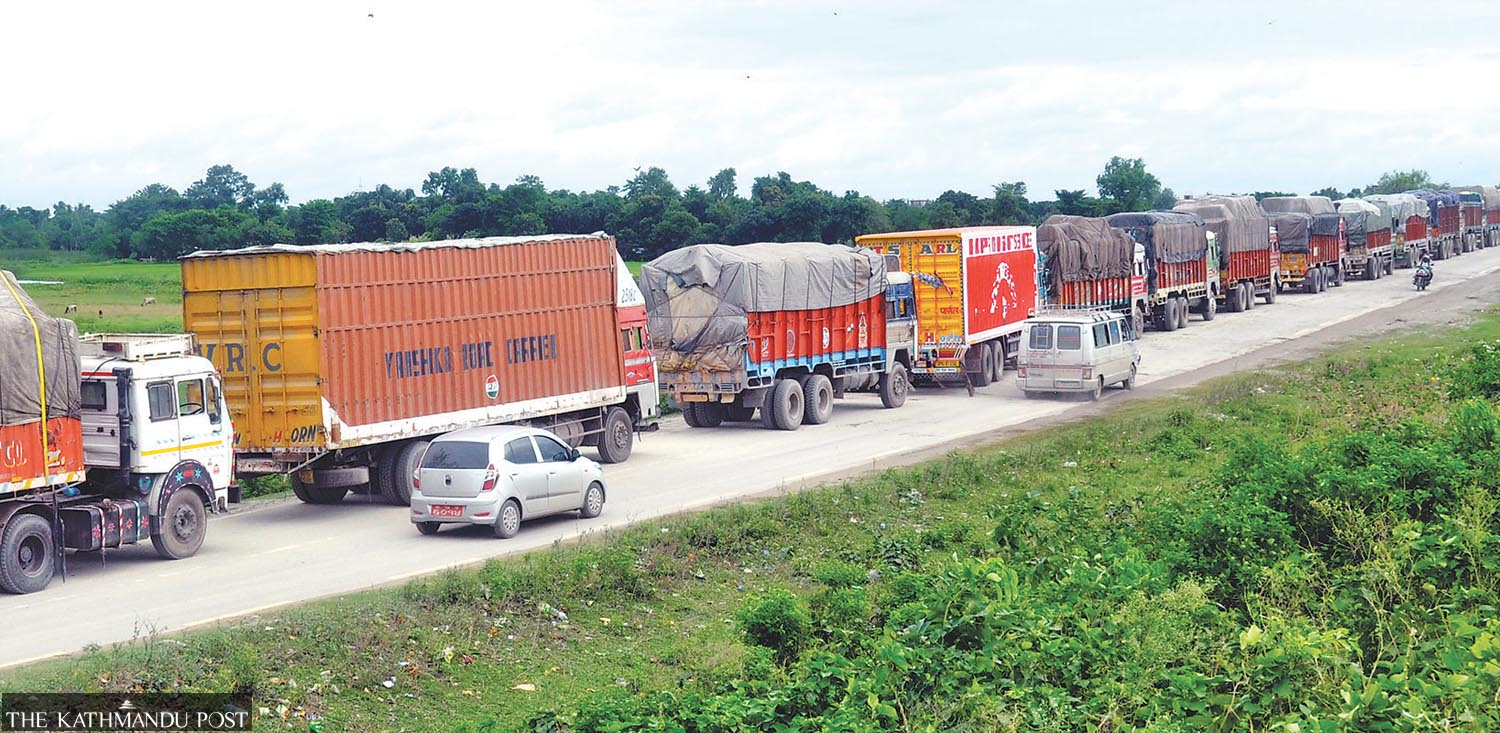Money
Nepal reviewing import ban after IMF prodding
The global lender says Nepal should take other monetary measures to deal with its foreign exchange reserve issue.
Krishana Prasain
Nepal is reviewing its seven-month-old import ban on certain products after the International Monetary Fund (IMF) questioned the wisdom of lengthening it since it was hurting trade and the economy.
The Washington-based organisation has delayed the second instalment of a $400 million loan to Nepal till February 2023, stating that it had not fulfilled the conditions. Nepal has received $110 million as the first instalment.
“We have fulfilled all the conditions set by the IMF when we agreed on the loan. Now they are concerned about Nepal's import restriction policy,” said Ishwori Prasad Aryal, joint secretary at the Ministry of Finance.
Economists say that prolonging trade restrictions goes against the principles of a free market economy.
The IMF has stated that such a ban does not have any positive impact on the economy, and the country should take other monetary measures to deal with its foreign exchange reserve issue, according to Aryal.
Alarmed by the fast pace at which Nepal's foreign currency reserve was going down, the government imposed import restrictions besides ordering importers to keep 100 percent margin amount to open a letter of credit.
The directive issued on April 26 embargoed 10 types of goods described as luxury items, among them mobile sets worth over $600 and motorcycles with a capacity of over 250 cc. Harsher restrictions followed, and mobile sets costing more than $300 and motorcycles with a capacity of more than 150 cc were banned.
On August 30, the government loosened the restrictions, and permitted the import of diamonds, large television sets, toys, cards, snacks and tobacco.
The ban on automobiles, mobile phones, liquor and heavy motorcycles will remain in place until December 15.
Following the Russia-Ukraine war that choked the global supply system causing prices to rise like never before, Nepal too suffered chronic current account deficits, and was increasingly vulnerable to external economic shocks with accelerating foreign reserve depletion. The situation has since improved.
With a mission to promote global economic growth and financial stability and encourage international trade, the IMF has lauded the different initiatives taken by the government to address the decreasing foreign exchange reserves, but it has expressed concern over banning imports.
An IMF team led by Robert Gregory visited Kathmandu from April 24 to May 2 to hold discussions on the first review under Nepal’s extended credit facility (ECF). The ECF provides financial assistance to countries with protracted balance of payments problems.
In a statement at the conclusion of the mission, the IMF said, “The team welcomed the authorities' determination to take measures to address decreasing international reserves and higher inflation. The increase in policy rates implemented in February was a welcome first step towards unwinding the current accommodative monetary policy stance.”
The statement added, “The team emphasised the need to further tighten monetary policy, including by increasing interest rates. Taken together with the gradual unwinding of Covid support measures in the banking system, this approach is expected to address decreasing international reserves without the need to resort to import restrictions that could exacerbate inflation and hamper economic growth.”

Automobile dealers said the import ban was choking business.
“More than 75 car showrooms have shut down. Another 70 are on the verge of closing down,” said Dhruba Thapa, president of the Nepal Automobile Dealers’ Association.
“We do not know when the restriction will be lifted. With no vehicle inventory to sell, it is difficult to pay bank interest, employee salaries and the rent,” said Thapa.
According to him, 8,000 people in the automobile sector have lost their jobs.
“To comply with IMF conditions, we are reviewing the import ban policy,” said Aryal. According to Finance Ministry officials, the import ban may be relaxed before the extended deadline of mid-December.
According to Aryal, the IMF has informed the Finance Ministry that they will start the first review on Nepal by November-end to release the second instalment. "The government has also been gradually relaxing the ban," he said.
In January, the IMF approved a $395.9 million extended credit facility for Nepal.
The 38-month financing package has been provided to Nepal for the Covid-19 response in mitigating the pandemic’s impact on health and economic activity, protecting vulnerable groups, preserving macroeconomic and financial stability, and supporting sustained growth and poverty reduction.
As per the agreement, the IMF will provide around $55 million in the second disbursement.
The Covid-19 pandemic took a heavy toll on Nepal’s economy. From April to July 2021, Nepal suffered a devastating second wave of Covid-19, interrupting a gradual recovery in economic activity.
Nepal’s economy contracted by 2.1 percent in 2019-20. The IMF estimated a partial recovery of growth at 2.7 percent for 2020-21 and forecast growth of 4.4 percent in 2021-22.
The collapse of the tourism and service sectors, which are key drivers for growth, will take time to recover, the IMF said. After a sharp drop in 2020, imports have rapidly grown, fuelling a large current account deficit.
Economists say they are surprised by the government's decision to prolong the import restriction despite an improvement in foreign exchange reserves.
According to Nepal Rastra Bank, the country's foreign exchange reserves are now sufficient to cover goods imports for 9.6 months, and goods and services imports for 8.3 months.
The balance of payments remained at a surplus of Rs12.43 billion, and gross foreign exchange reserves stood at $9.48 billion in the first quarter of the fiscal year ended mid-October, the central bank said.
As a result of the import ban, goods imports decreased 16.2 percent to Rs401 billion in the first quarter of the current fiscal year compared to the same period in the last fiscal year.
In the last fiscal year ended mid-July, Nepal's imports crossed the Rs2 trillion mark for the first time. Traders say that the value of imports rose mainly due to global inflation. A stronger dollar added to the woes.




 18.12°C Kathmandu
18.12°C Kathmandu













